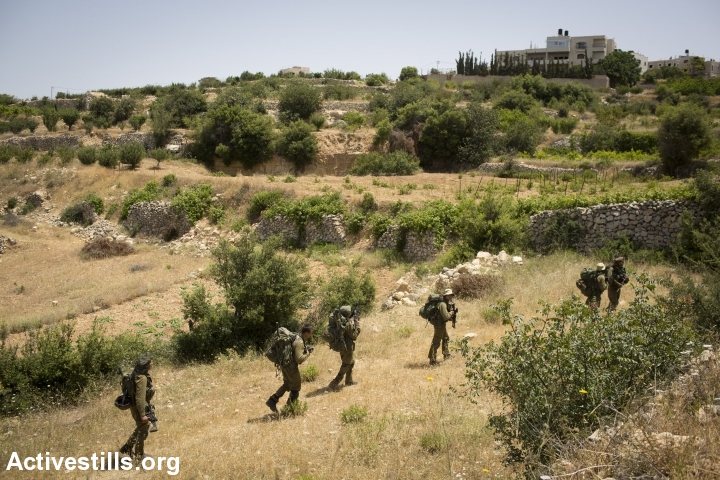Kidnappings led to the largest military operation in the West Bank since the Second Intifada.
Israeli military forces on Monday located the bodies of three teenage yeshiva students who have been missing and assumed kidnapped for over two weeks. The bodies of Eyal Yifrah, Gilad Shaer and Naftali Frenkel were found buried in a field near Halhoul, in the Hebron area.
The three, two of whom are 16 years old and the third 19, were hitchhiking home from their yeshiva in a West Bank settlement when they were believed to have been kidnapped.
The Israeli army had surrounded the homes of two of the suspected kidnappers within minutes of the announcement, with troops reportedly preparing to demolish the houses. In recent days, the Israeli government announced a return to its policy of punitive home demolitions.
Read +972’s full coverage of the kidnappings and ‘Operation Brother’s Keeper’

Israeli Border Police were reported to be deployed heavily in anticipation of revenge attacks by settlers in the northern West Bank.
Following the kidnapping, Israel launched a major military operation in the West Bank, dubbed “Operation Brother’s Keeper.” The operation, while searching for the kidnapped teenagers in the Hebron area, also had a second aim: to target Hamas and other Palestinian groups throughout the West Bank.
Over 500 Palestinians have been arrested and six were killed during the operation thus far. The entire southern West Bank was on lockdown for over a week as troops searched homes, fields, caves and buildings. Restrictions were even placed on the ability of Hebron-area residents to travel abroad, for those who were able to leave their cities and towns.
The Israeli cabinet was called for an emergency meeting Monday night and Prime Minister Benjamin Netanyahu was expected to make a public statement.
Housing Minister Uri Ariel put out the following statement moments after the news was announced: “In war, on the one hand you need to strike down terrorists without any mercy, and on the other hand, you need to provide a suitable Zionist response.” The latter part of his statement likely refers to building new settlements.
On Sunday night, tens of thousands of Israelis filled Tel Aviv’s Rabin Square in a demonstration of solidarity with the teens’ family.
Rachel Frenkel, Naftali’s mother, pleaded that children like hers no longer be used as “bargaining chips,” echoing much of the rhetoric on both sides, Jewish Israeli and Palestinian, that pleads for innocent children and civilians to be left out of violence in the Middle East conflict.
Noam Shemtov contributed to this report.


